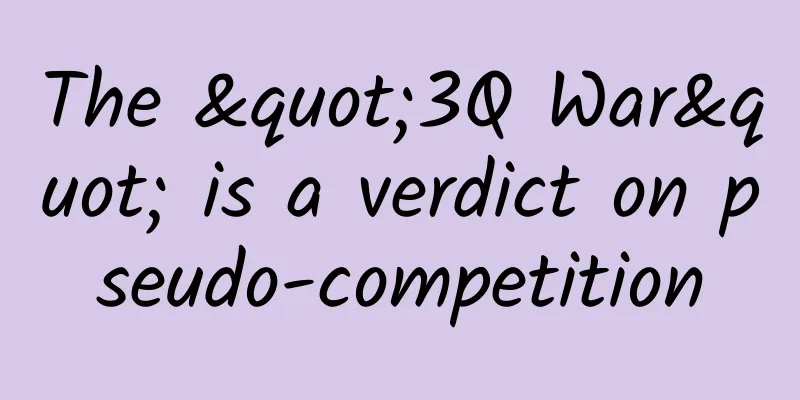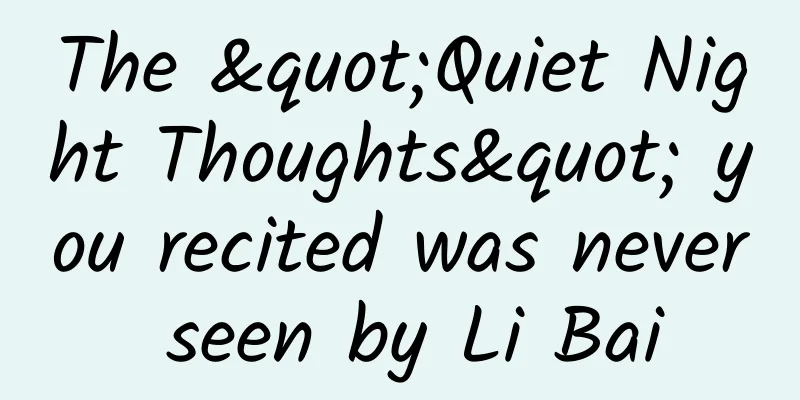The "3Q War" is a verdict on pseudo-competition

|
The evolution of the "3Q War" and the final judgment of the Supreme Court are a judgment on pseudo-competition on the Internet. This reminds us that respecting the spontaneous order of the market and forming institutional norms that encourage reasonable competition is the best arbitration. On the 16th, the Supreme Court made a final judgment on the Qihoo case against Tencent for abuse of market dominance, finding that Tencent did not infringe on monopoly rights, and rejected Qihoo's appeal, upholding the original judgment. The 3Q war, which lasted more than four years and was called "China's first Internet antitrust case" by the industry, has come to an end. The cause of the 3Q war was not the pursuit of justice for the Internet, but more of a move by the two companies to compete for market share. Different market positions, different business styles, and shrewd and fierce marketing strategies all provided ammunition for this war, and the battle plan drawn up by arrogance, willfulness, and ostentation eventually led to a face-to-face fight between the two companies. Although this battle was an external manifestation of full competition in the Internet market, the practice of forcing the majority of users to choose sides fully exposed the true side of its pseudo-competition. This normal practice in the Internet market at that time not only reflected the grassroots atmosphere in the growth process of the Internet market, but also made the 3Q war no longer just a dispute between the two companies, but also had a broader and deeper meaning: what are the rules of the game for Internet companies, whether they have the right to interfere with the free choice of users, etc., which formed a torture for the entire industry. This torture is actually related to the prospects of the Internet market. Fortunately, the 3Q war produced a "catfish effect". 360 opened its software platform and launched a free antivirus business model. Improving its chances of survival was no longer its main concern, and it became the leader in the antivirus software market. Tencent ended its "imitation plus bundling" business strategy and turned to consolidating its market position through innovation, investment, acquisitions and mergers. Looking back today, the process of the 3Q War, which changed from holding users hostage to focusing on user experience, is worth savoring. In addition to showing that the two companies have the awareness and ability to correct themselves, it also shows the following points: First, competition has a positive effect, which prompts companies to reflect more on their own problems. The 3Q War, due to its directness, accelerated the transformation process of both sides. Second, the market has a self-purification effect. The two sides turned from the early pseudo-competitive state to the real competitive state, and independent decision-making played an important role. Third, how the management department intervenes is extremely important. In other similar competitions, there is no shortage of examples of management intervention, but many management interventions have had the opposite effect, encouraging companies to rely too much on the government and lose the motivation for self-correction and innovation. In the 3Q War, management intervention also occurred at one time, but its role was to stop pseudo-competition. This was an appropriate intervention at the right time, so it was conducive to stimulating corporate innovation. The Supreme Court’s final judgment on the 3Q War is also an intervention, an intervention at the judicial level. Although it was a little later than the 3Q War, it not only gave companies time to adjust themselves, but also filled the institutional gaps brought about by the 3Q War, and drew a clear line for the "market dominance problem" in the Internet field. The judgment shows that there is also anti-monopoly in the Internet field, and what should be opposed is not the monopoly formed by full competition, but the monopoly formed by restricting competition. In this regard, the evolution of the "3Q War" and the final judgment of the Supreme Court are a judgment on pseudo-competition in the Internet.In the history of business wars, there are many precedents of both sides being hurt by fierce competition. The positive incentive effect generated by the 3Q war is not inevitable. This reminds us that respecting the spontaneous order of the market and forming institutional norms that encourage reasonable competition is the best arbitration. This is not only effective in the Internet field. As a winner of Toutiao's Qingyun Plan and Baijiahao's Bai+ Plan, the 2019 Baidu Digital Author of the Year, the Baijiahao's Most Popular Author in the Technology Field, the 2019 Sogou Technology and Culture Author, and the 2021 Baijiahao Quarterly Influential Creator, he has won many awards, including the 2013 Sohu Best Industry Media Person, the 2015 China New Media Entrepreneurship Competition Beijing Third Place, the 2015 Guangmang Experience Award, the 2015 China New Media Entrepreneurship Competition Finals Third Place, and the 2018 Baidu Dynamic Annual Powerful Celebrity. |
<<: Will the digital revolution destroy the middle class?
>>: Why didn't a larger iPad appear this year?
Recommend
How to use soft articles to create word-of-mouth marketing?
Word-of-mouth marketing is a widely used promotio...
Android source code download: APP startup guide
Functional classification: Tools Supported platfo...
Should Samsung consider the survival of Note? Would it be a good idea to merge it with S?
Samsung introduced the concept of giant phones to ...
Why was the earthquake in Hualien, Taiwan Province felt strongly in Jiangsu, Zhejiang and Shanghai?
According to the official measurement of the Chin...
Let's talk about the relevant strategies for operating tourism product channels from three dimensions: industry analysis, functional framework, and channel operation.
Based on the "Theme Tour" channel in th...
The more beautiful the parts that girls care about the most, the more dangerous they are!
One minute with the doctor, the postures are cons...
Many players are scrambling for territory in India to decode the overseas business secrets of Chinese mobile phones
The rise of Chinese mobile phone manufacturers is...
Download link of "Su Mang: Live a Beautiful Life | A Smart Way for Women to Live a Life without Hardship or Tiredness"
Download link of "Su Mang: Live a Beautiful ...
Ice does not conduct electricity? Did you notice the physics knowledge in Nezha 2?
Review expert: Zhou Hongzhi, senior laboratory te...
A comprehensive guide to image formats that mobile developers should not miss
First, let's talk about several old-fashioned...
Are wild tigers frequently entering villages? In fact, there are far more captive tigers than wild ones
Editor’s Note: On November 18, 2024, a tiger appe...
Fun fact: One day in heaven equals one week on earth? Do people in heaven live longer?
From 2015 to 2016, NASA conducted a one-year &quo...
Douyin Store Practical Training Camp starts from 0, Douke Alliance expert sales model, super detailed Q&A
Douyin Store Practical Training Camp starts from ...
Apple closes iOS 15.0.2 system verification channel, and cannot downgrade after upgrading to iOS 15.1
On November 3, after releasing the official versi...
From 0 to 3.87 million followers, the cosmic master Hawking teaches you how to attract fans and monetize them!
On May 13, Professor Hawking , who had opened a W...









